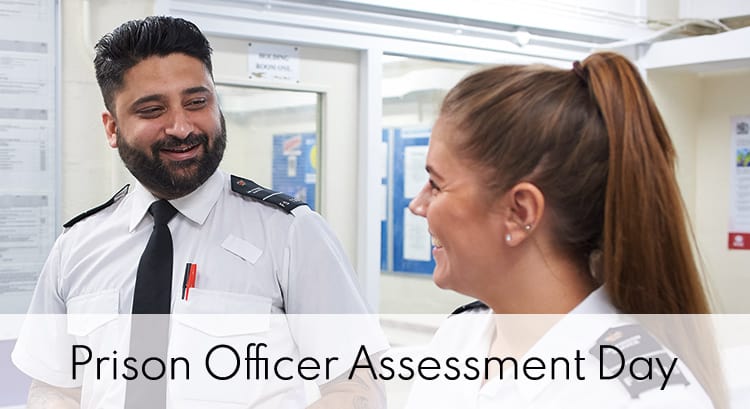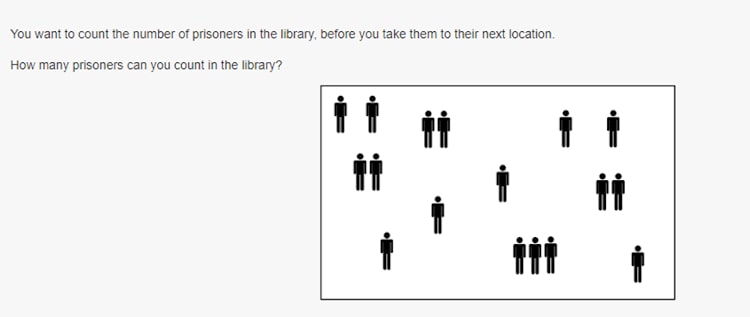Prison Officer Assessment Day: How to Pass in 2023
Congratulations on making it to the prison officer assessment day! You’re only a few steps away from securing your dream job in the prison service.
Keep reading for all the information, advice, examples and tips you should know to pass the assessment day and successfully become a prison officer.
In this free prison officer assessment day guide we will show you:
- The 6 assessments and exercises you’ll take part in on the day
- 2 must-know example questions
- 3 expert tips to help you pass the assessment day with great results
Get the best tailored prison officer practice tests and exercises here.
What is the prison officer assessment day?
The assessment day is the final stage of the recruitment process to become a prison officer.
You will only be invited to attend an assessment day if you’ve successfully completed your initial application and prison officer selection test.
On the day, you’ll take part in several tests and exercises that are designed to assess whether you have the skills, abilities, strengths and behaviours required to be an effective prison officer.
You will have the option to book your assessment day for any available time slot and assessment centre location.
Important Note: Until 2018, the prison officer assessment day was commonly known as the Recruitment Assessment Day (RAD). It is now called the Assessment and Recruitment Centre (ARC).
What to expect at the prison officer assessment day
The ARC is a half-day event held at prison officer assessment centres around the UK.
Your assessment day will start with an introductory briefing session where you’ll get all the information you need and can ask any questions if you have them.
You will then complete six different assessments:
- Medical assessment (15 minutes)
This is carried out by a trained nurse to ensure you’re safely able to take part in the upcoming fitness test. There will be an eye test, a hearing test and a basic health screening, which includes a blood pressure check.
You’ll also complete an online health questionnaire which may lead to a follow-up appointment to discuss any medical conditions.
- Fitness test (30 minutes)
There will be a bleep test to assess your endurance and agility, which you must pass at level 5.4.
There will also be a grip test and shield test to assess your upper body strength, where you must grip a piece of equipment and hold up a 7kg riot shield for a set period of time.
- English test (30 minutes)
This is a written aptitude test that assesses your verbal communication skills. You’ll need to show that you can write accurately and understand case notes and reports.
Check out our verbal reasoning test guide for more information about this type of test and how to pass it.
- Numeracy test (30 minutes)
This is a written aptitude test that assesses your basic numerical skills such as addition, subtraction, multiplication, division, ratios, fractions, tables and 24-hour time. A calculator is allowed.
Make sure to read our numerical reasoning test guide for examples, practice questions and top tips.
- Role play (35 minutes)
You’ll play the part of a prison officer in two role play scenarios that depict challenging situations you could face on the job. Each role play will go for about 10 minutes, plus preparation time.
You need to show that you can effectively manage the situation with your verbal and non-verbal communication skills, influence, understanding, integrity and respect.
- Interview (30 minutes)
Finally, you’ll have a one-on-one interview. This will focus on your strengths, motivations and interests rather than your past experiences, and will also assess your fluency in English.
Our interview preparation guide has heaps of useful tips to help you make a great impression and ace your interview.
At the end of the day, there will be a debrief for feedback and questions.
There’s no set dress code for the prison officer assessment day, but we recommend wearing smart-casual clothing to make a good impression and show that you’re taking it seriously.
You should also bring a set of exercise clothes to change into for the fitness test.
Prison officer assessment centre example questions
For a better idea of what to expect at the prison officer assessment day, here are a couple of example exercises to try at home.
Here’s a simple numeracy test question from the HM Prison and Probation Service website:
And here’s a video about the role play simulation:
You can find the rest of this series of videos here.
Getting your prison officer assessment day results
At the end of the assessment day, you’ll find out straight away if you were successful or unsuccessful. You’ll also be emailed a breakdown of your results.
If you were successful, you can apply for any current prison officer vacancies and you’ll progress to the pre-employment checks. If you were unsuccessful, you can apply for another assessment day after six months.
How to pass the prison officer assessment day: 3 pro tips
#1: Practice makes perfect
You need to pass each assessment on the day to get a successful result, so it’s essential that you prepare for each one individually.
Make sure you check out our thorough guides for practice questions, explanations, examples and expert tips:
- Numerical reasoning test guide
- Verbal reasoning test guide
- Role play interview guide
- Interview preparation guide
And get our top recommended prison officer assessment day practice tests here.
#2: Update your CV
With so many other things to think about on assessment day, it’s easy to overlook your CV.
But it’s a good idea to have a strong, updated CV with you because this is what the assessor will be looking at during the interview, and what they’ll refer to when making hiring decisions later on.
Make sure your CV is up to date and tailored to the job you want.
It should summarise your professional skills and benefits and it should be short, sweet and memorable – try not to go on for more than two pages.
#3: Take good care of your health
Your health is extremely important if you want to be a prison officer, and that needs to show during the medical assessment and fitness test.
Make sure you exercise regularly to build up your strength and fitness, eat well, and avoid too many caffeinated drinks as they can affect your blood pressure.
You can also practise squeezing a tennis ball or stress ball to help you prepare for the grip test, lift 7kg weights for the shield test, and simulate the bleep test at home with this video.
You’ve got this! Good luck!
Some more guides to help you succeed…
- Numerical Reasoning: Numerical Reasoning Test Guide: 5 Proven Tips to Succeed
- Verbal Reasoning: Verbal Reasoning Test: What You Need to Know to Pass
- UKCAT: UKCAT Test Guide: 4 Secrets to UKCAT Success 2020
- Watson-Glaser: Watson-Glaser Test: Everything You Need to Know to Pass
- Mechanical Comprehension: Mechanical Comprehension Test Guide 2020




